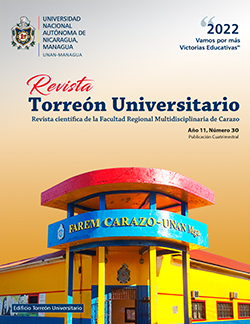Contributions of Siglo XXI Education to the professionalization of public servants
DOI:
https://doi.org/10.5377/rtu.v11i30.13394Keywords:
skills, 21st century education, public servants, proffesionalizationAbstract
The present study presents a critical assessment of the contribution of 21st century education to the study of the processes of professionalization of ethical and competent public servants. This is developed through the analysis of different types of education, education paradigms and trends in education, in particular the approach to competences and types of competences, both general competences and specific competences with which public servants must be trained so that they can contribute to the transformation of the public administration for which they work in particular and for their society in general. In this work special emphasis is placed on the ethical aspect and on the critical aspect that the education of the 21st century. The document is structured in the following sections: introduction, material and methods, analysis of results, conclusions and bibliographic references.
Downloads
References
Bitbol, A. (1996). Enciclopedia Jurídica OMEBA. Buenos Aires: Driskill S.A.
Delval, J. (2012). La escuela para el siglo XXI. Sinéctica: Revista electrónica de educación.
Escorcia, J. (2009). Derecho Administrativo. Managua: Editorial Jurídica.
Fierro Celis, F. (2017). Las competencias laborales en el sector púbico: un análisis desde las escuelas de las competencias laborales. Revisión, 92-108.
Gobierno del Estado de México. (2017). Modelo de competencias de desempeño. Instrumentos metodológicos que operan a favor de la profesionalización de los servidores públicos del Poder Ejecutivo del Gobierno del Estado de México.
Kincheloe, J. (2008). La pedagogía critica en el Siglo XXI: evolucionar para sobrevivir. En M. y. Kincheloe, Pedagogía crítica: de qué hablamos, dónde estamos.
Michoa, Y. (2015). La profesionalización del servicio público en el Poder Ejecutivo del Gobierno del Estado de México. Espacios Públicos.
Moreno, C. (2014). Las competencias laborales como eje fundamental de la profesionalización de los servidores públicos en Iberoamérica. XVI CONFERENCIA IBEROAMERICANA DE MINISTRAS Y MINISTROS DE ADMINISTRACIÓN PÚBLICA Y REFORMA DEL ESTADO. Ciudad de México.
Organización de las Naciones Unidas para la Educación, la Ciencia y la Cultura. (2018). Guía Abreviada de Indicadores de Educación para el ODS 4.
Organización de Naciones Unidas. (27 de 11 de 2020). Organización de Naciones Unidas. Obtenido de https://www.un.org/sustainabledevelopment/es/education/
Orozco Alvarado, J. (2018). La didáctica de las ciencias sociales.
Ramos, C. (2015). Los paradigmas de la investigación científica.
Roveda, A. (2010). Los principios fundamentales de la Educación del Siglo XXI. Signo y pensamiento.
Ruíz, L. (2010). Reseña de "PEDAGOGÍA CRÍTICA. DE QUÉ HABLAMOS , DÓNDE ESTAMOS". Revista Interuniversitaria de Formación del Profesorado, 143-146.
Villalva, M. B. (1997). La formación y los empleados públicos. REIS.
Downloads
Published
Issue
Section
License
Copyright (c) 2022 National Autonomous University of Nicaragua, Managua (UNAN-Managua).

This work is licensed under a Creative Commons Attribution-NonCommercial-NoDerivatives 4.0 International License.
The authors who publish in this journal agree to the following terms.
- The author or authors of the articles, essays or research grant the National Autonomous University of Nicaragua, Managua (UNAN-Managua) the editing rights (copyright) of the submitted work, therefore the University has the exclusive right to publish the article for the entire copyright period.
- These copyrights/authors authorize Torreón Universitario Magazine and the University to edit and disseminate/publish the article in said Magazine, including printed and electronic reproduction, storage, retrieval and any other type of publication, and sources of secondary information as services. of summaries and databases, they also empower it to protect the article against unauthorized use for dissemination by printed or electronic media (PDF, HTML, EPUB, XML or others).
License for use of content
The magazine uses the Creative Commons Attribution-NonCommercial-NoDerivs 4.0 International License.
Under this statement:

This journal is licensed under a Creative Commons Attribution-NonCommercial-NoDerivatives 4.0 International License. It can be copied, distributed and transmitted publicly as long as the author and source are cited (Revista Torreón Universitario), it should not be modified or used for any commercial purpose. The full license can be found at http://creativecommons.org/licenses/by-nc-nd/4.0/.



